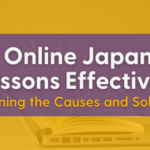What are the Benefits of Children Learning Japanese as a Second Language?
“What are the benefits of my child learning Japanese as a second language?”
“What should I be careful about when teaching my child Japanese?”
“What are effective ways for children to study Japanese that will benefit their future?”
More and more parents are asking these questions. By learning Japanese, you can not only enjoy anime and manga in the original language, but also expand your opportunities to study abroad and find employment in Japan in the future. You can also deepen your understanding of different cultures and raise your child to have a global perspective.
In this article, Eri-san from JPLT Online Japanese Language School explains the benefits and precautions of children learning Japanese. Read on for tips to support your child’s Japanese learning journey and build a rich future!
■10 Benefits of Learning Japanese as a Second Language for Children
1. Deepening Cultural Understanding
Through learning Japanese, you can directly enjoy culture such as anime, manga, Japanese movies and literature. By understanding the nuances and background of words, you can deepen your understanding of the works and enrich your cultural knowledge. This will increase your interest in different cultures and foster an international perspective.
2. Expanding Career Possibilities
Mastering Japanese will expand your career possibilities in Japanese companies and Japanese-affiliated companies. Bilingual and multilingual talents are especially valued in a global economy. Having Japanese language skills will improve your competitiveness in the job market and increase your opportunities to participate in international projects.
3. Enhancing Cognitive Abilities
It is said that learning a second language improves the cognitive function of the brain. In the process of learning new language structures and vocabulary, the brain is activated, improving memory and concentration. In addition, understanding different grammar and usage helps develop problem-solving skills and creative thinking.
4. Strengthening Communication Skills
Learning Japanese makes it possible to actually communicate with Japanese people. When language is no longer a barrier, you can build deep friendships and deepen mutual understanding through cultural exchange. In addition, communication experience in a multilingual environment will develop skills that can be applied to other languages.
5. Increasing Learning Motivation
Learning a new language has the effect of increasing motivation to learn. Especially for children who are interested in Japanese culture, learning Japanese is a motivation to learn while having fun. A sense of accomplishment encourages students to take on other academic subjects, leading to improved overall academic ability.
6. Forming a Global Perspective
Learning about Japan’s history, social structure, and business practices helps develop an international perspective. Through interactions with people from different cultural backgrounds, students develop the ability to respect and understand diverse values. This allows children to develop a sense of awareness as global citizens.
7. Enhancing Travel Experiences
Understanding Japanese enriches the travel experience when visiting Japan. You can enjoy guided tours at tourist spots and conversations with local people, and experience Japanese culture at a deeper level. Being able to speak the language increases the freedom of tourism and improves the quality of your trip.
8. Experiencing the Beauty of the Language
Learning Japanese is also an opportunity to experience the beauty of unique expressions and vocabulary. By coming into contact with haiku, tanka, and classical literature, you will understand the artistic nature of language and enrich your sensibilities. You will also enjoy the rhythm and sound of words, deepening your cultural education.
9. Expanding Educational Opportunities
Acquiring Japanese language proficiency will increase your learning opportunities at Japanese educational institutions. Students will be able to deepen their expertise at Japanese universities by participating in exchange programs and international programs. This will strengthen the foundation for building a global career.
10. Diversifying Self-Expression
Having the ability to communicate in multiple languages will broaden the scope of self-expression. Being able to express your thoughts and feelings through Japanese will allow you to deeply engage with people from diverse cultural backgrounds. This skill will be a great asset in future international exchanges and business.
■4 Disadvantages of Learning Japanese as a Second Language for Children
1. Increased Learning Burden
Adding a new language to a child’s daily life may increase study time and increase the burden. Time management may become difficult, especially if they are already studying many subjects.
2. Impact on Learning Other Languages
Focusing on the complex grammar and writing system of Japanese may reduce concentration and interest in learning other languages. Confusion may occur, especially if there are many languages to learn other than your native language.
3. Cultural Adaptation Challenges
While exposure to Japanese culture deepens intercultural understanding, it can also be confusing due to differences from the culture you are familiar with. In particular, it is necessary to adapt to the social customs and values unique to Japanese culture.
4. Practicality Issues
The practicality of Japanese varies depending on the region of residence and future career. In areas where there are few opportunities to use Japanese, there are limited opportunities to utilize what you have learned, and it may be difficult to maintain motivation.
■ Summary
Understanding the Benefits of Learning Japanese as a Second Language for Children
There are many benefits to children learning Japanese as a second foreign language. First of all, acquiring multiple languages improves cognitive and problem-solving abilities and improves thinking skills. In addition, exposure to different cultures through Japanese anime and manga broadens your international perspective and fosters tolerance for different cultures. In addition, learning Japanese will broaden your future career options and increase business opportunities, especially in the Asian region. Logical thinking and attention to detail are strengthened in the learning process, which has a positive impact on other areas of study.
JPLT School offers personalized support to help children enjoy learning Japanese. With an online platform, we provide a flexible learning environment for children to learn effectively at their own pace. Visit the official site for more details and start a new learning journey with JPLT School!





